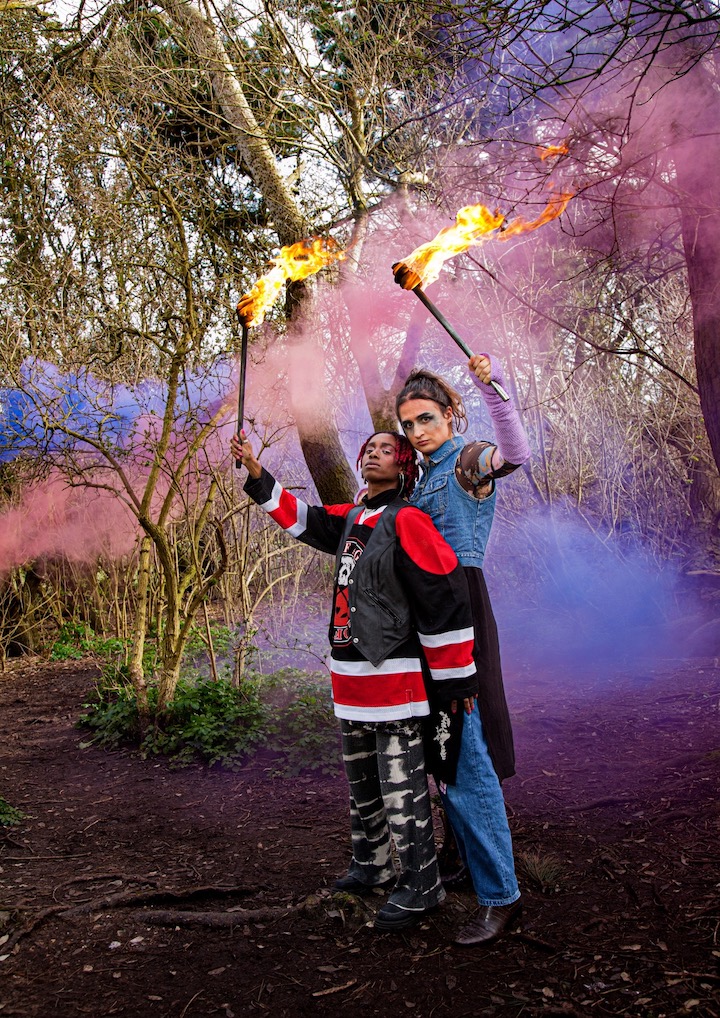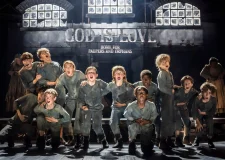Galatea
Taking the heart of John Lily’s 1580s and long neglected play with its themes of gender swapping and a universal love is a clever and poignant concept in a time when such issues are so prevalent. And Emma Frankland and Subira Joy’s reworking, edited by Andy Kesson with BSL translation support by Duffy, is an extraordinary success in so many ways. Cleverly working with the original text but exploiting wherever possible current questions about gender and sexual preference this 2023, long in the making production, is fascinating – but not at the expense of being entertaining.

It was with great relief that what I was expecting to be a promenade performance was actually being given a far more conventional staging in the open air, and the stage and associated projections were both well conceived and executed although friends sat to the extreme sides said that at the matinee performance the projected captions were difficult to read. And thinking further on this, a promenade performance of a production clearly focussed on inclusivity would have been less inclusive for anyone with mobility issues.
Those captions are a vital part of this production where many of the very inclusive cast are performing using both BSL and ASL sign language. This is not tricksy nonsense, many of the cast are deaf or with limited hearing, some American, hence the ASL, and some neuro-diverse.
What this achieves though goes far beyond the idea of being a truly inclusive production, it also turns the tables on those of us who have perfect hearing, we are put in the position of less abled audience members and forced to look and to take in the words in an alien manner. It certainly focussed the way I watched.
The story is very much of its time with gods, nymphs and monsters but the language, here presented in many forms, is far easier to follow than that of Lily’s contemporary William Shakespeare, which does call into question why this work is so neglected. And whilst the major themes that are explored ring so true in a contemporary way it is only at the very end that in a quite brilliantly played speech from Hebe that the tyranny of beauty is really revealed. In a world obsessed by conventional concepts of beauty, of body shaming and the online platforms where associated bullying takes place, this newly conceived production really hits home.
The production, perhaps not at this stage fully developed, is all the same captivating. It looks good, the staging is well thought out, the costumes are excellent and there are some really very impressive performances. Sophie Stone makes a commanding and compelling Venus and Nadia Nadarajah is equally powerful as Diana, frankly Neptune never stood a chance against these two. Femi Tiwo’s Galatea has a gentle innocence and slight but appropriate reserve. Macy-Jacob Seelochan is particularly impressive as Phillida and Richard Peralta’s Rafe is beautifully crafted and performed. Caz Teague’s Peter brings an element of street cred to the language with comfortable ease. The ensemble is well drilled but how I wish that in the gentle choral parts they had not been placed so far left that it was not immediately obvious that their singing was in fact live.
Finally to two stand out performances, already mentioned but not named, Bea Webster’s depiction of the about to be sacrificed Hebe, mainly delivered in BSL, was truly exceptional, a breathtaking display of both skill and passion that few will forget. Finally a Cupid that whilst Puckish, was also a creation all their own. Wet Mess brought the mischievous fairy wickedly to life, balancing humour and evil in equally part to the role.
Having witnessed a matinee performance some of the lighting and projections were not as impactful as they might be for an evening showing and would suggest wrapping up warm to get the full power of a piece that is sure to grow in stature.
Andrew Kay
Brighton Festival 2023
Shoreham
14/5/23
[rating 4/5]





















